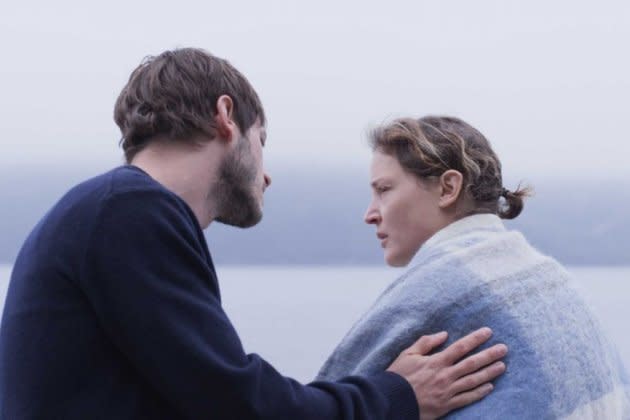‘More Than Ever’ Review: Vicky Krieps Delivers Another Knockout Performance in a Low-Key, Tragic Slow Burn
- Oops!Something went wrong.Please try again later.
- Oops!Something went wrong.Please try again later.

Hélène Mouchet (Vicky Krieps) is probably dying. She has been diagnosed with an idiopathic fibrosis of the lungs, meaning none of her doctors really has much idea of how to treat her condition. They do know that it will eventually result in suffocation, unless she is able to undergo a lung transplant — which is far from certain to work. In “More Than Ever,” a thoughtful, well-acted drama from writer-director Emily Atef (changing the pace from her work on TV’s “Killing Eve”), this setup is the basis for an exploration, through the lens of one woman’s experience, of how serious disease might be faced, both medically and socially. Strand Releasing is bringing the film to U.S. audiences more than a year after its Un Certain Regard premiere in Cannes.
Hélène finds the awkward response of her social circle unendurable; people mean well, but are terrified of saying the wrong thing. They offer platitudes, or unfounded assertions that everything will definitely work out just fine. Her husband Mathieu (Gaspard Ulliel, precise and effective in one of his final roles before the tragic accident that claimed his life in 2022) is similarly at sea, unable to understand what his wife is going through. As he tells a friend, he’s never spent so much time with her, or felt so far apart.
More from Variety
About a third of the way into the film, Hélène makes a decision that baffles her husband, but makes total sense from her perspective. She travels, on her own, to Norway, drawn by the idea of clean air and a natural setting, and by the promise of the company of a new friend she has made, a mysterious man (Bjørn Floberg) known as Mister online, or Bent in real life. Perhaps most importantly, she wants to get away from being around everybody who knows her.
As you might expect, the performances are highly accomplished. Ulliel portrays a man struggling to do the right thing: Mathieu is aware that Hélène is the person to whom this is all actually happening, and yet it’s also happening to him. You can see the character wrestling with the impulse to foreground his own experience, which is understandable and somehow still not quite fair. This is a tragedy in which he’s a main player: It would be crazy for the husband of a dying woman not to have to process all sorts of huge emotions, and to struggle with doing so. Yet he’s still not the one dying. Ulliel doesn’t play the role entirely for sympathy, but brings a believably bruised sensitivity to Mathieu’s plight.
Bent, meanwhile, is the other man, of sorts, in Hélène’s life. A Norwegian stage and screen veteran, Floberg gives a skillful, subtly calibrated performance, calculated to keep us off-balance. Hélène has invested an enormous amount of trust in her new internet friend — trust that he is who he says he is, trust in his story — and Floberg plays his role carefully, with no twinkle in his eye to reassure an audience that Hélène’s affection is not misplaced. One moment we feel bad for not fully trusting him, only
to second-guess that impulse moments later.
But it’s undeniably Krieps’ show. We’ve seen her play spiky, perverse mischief opposite Daniel Day-Lewis in “Phantom Thread,” and thrilled to the frosty autocracy of her Empress Elisabeth of Austria in “Corsage” — though her work here is perhaps closest to her role as a self-possessed, slightly adrift screenwriter tethered to a husband who doesn’t understand her in “Mia Hansen-Løve’s “Bergman Island.” Hélène is a pricklier character, however. She doesn’t behave like a terminally ill woman in a traditional tearjerker — all photogenic pallor and martyred suffering — and she refuses to take leave of the world politely or set anyone else at ease.
One of the most fundamental questions “More Than Ever” asks is what, if anything, the dying might owe to the living. Are we (and perhaps women in particular) allowed to be selfish in death, and if not, why not? Atef and co-writer Lars Hubrich don’t seek to fully answer all the questions raised here, but give the audience plenty of time and space to consider these issues for themselves.
Best of Variety
Sign up for Variety’s Newsletter. For the latest news, follow us on Facebook, Twitter, and Instagram.
